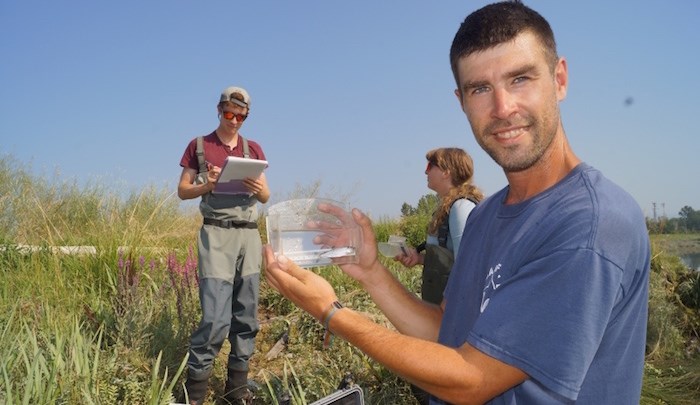An oil spill in the Fraser River from an expanded Trans Mountain pipeline would likely be more difficult to clean up than thought by its proponents and the Canadian government, according to a new report from environmental charity group Raincoast Conservation Foundation.
And such a spill from the pipeline’s crossing upstream at the Port Mann Bridge, or even from an oil tanker passing by the West Dyke, would imperil already threatened salmon populations, according to Raincoast biologist Dave Scott, co-author of the report.
 Raincoast biologist Dave Scott, co-author of the report that outlines some of the complexities of an oil spill in the Fraser River and its impact on wild salmon.
Raincoast biologist Dave Scott, co-author of the report that outlines some of the complexities of an oil spill in the Fraser River and its impact on wild salmon.
Furthermore, the report notes that there is “no safe time for an oil spill” in the river.
“Our main point is that the pipeline runs directly through the Lower Fraser watershed. In the Lower Fraser there’s a combination of different species of salmon at different life stages; so whether it is juvenile salmon rearing in the estuary or adult salmon moving upstream to spawn… There’s always some salmon in the Fraser that would be susceptible to a pipeline spill,” said Scott, who is studying juvenile salmon behaviour on Iona Island this summer.
The existing pipeline was constructed under the river in 1953 and has not broken in that location since. The pipeline’s owner (up until it was purchased by the Canadian government this year), Kinder Morgan, has reported 82 mostly minor spills to the National Energy Board (NEB).
The company and federal government are in the latter stages of approval from the NEB to triple its capacity in order to ship more dilute bitumen from Alberta to overseas markets. This will increase tanker traffic seven fold from Burnaby.
Kinder Morgan has cited a number of safety measures for the expanded pipeline, such as thicker pipes, increased depth and isolation valves.
Although Trans Mountain has modelled oil spills and conducts spill response exercises off of Richmond’s shoreline, Raincoast notes the models assumed a straight channel without complexities of log booms, rip rap, or infrastructure” and “this underestimates the potential volume of stranded oil.”
Said Scott: “The Lower Fraser has a lot of complexities to it; there are a lot of logs, rip rap and a lot of different places where spilled oil would get hung up. It would be in the river over time.”
The report claims, “once on these shores, it is extremely challenging, if not impossible, to recover that oil.”
Raincoast details some of the unique risks of diluted bitumen (or dilbit, which is like crude oil) in the river.
Spilled dilbit is more likely to sink in the river mouth because the area is a swirling pool of saline ocean water and sediment-rich fresh water. The salinity makes it easier for oil to combine with sediment, so there is a greater chance of the toxic sludge sinking.
“Dilbit that has submerged or sunk is extremely difficult to recover. Once oil has submerged below the water’s surface, there is almost no ability to detect, contain, or recover that oil,” notes the report, citing the disastrous 2013 Enbridge pipeline break in the Kalamazoo River, where up to 636,000 litres of oil ended up on the river bed.
But according to NEB’s May 2016 report, “Trans Mountain said that the Kalamazoo has much higher turbidity levels and a more turbulent flow regime. Trans Mountain said that, in the Fraser River, oil that might be deposited to sediment would not find a low flow area where it could be trapped, as it did in the Kalamazoo River. It said that the oil would continue to be dispersed and moved down-river by natural process in the river bed.”
City of Richmond Mayor Malcolm Brodie has stated he has “grave reservations” about diluted bitumen shipments. The city was an NEB intervenor to glean information about pipeline spills in the river. More recently, Brodie also voiced opposition to a new jet fuel terminal on the South Arm but chose not to take any legal action against senior government approval agencies.
Scott also asserted oil spills are not the only threat. Climate change from burning Trans Mountain’s product is also threatening Fraser River salmon habitat.
Trans Mountain spokesperson Ali Hounsell did not refute climate change from burning fossil fuels but told the Richmond News the company welcomes “working with government and stakeholders to advance strategies that will reduce emissions and minimize the environmental footprint of our pipeline operations.”



